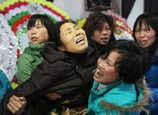
The couple's two daughters live overseas.
They want to move into a nursing home close to hospitals and have found some in suburban areas. But they charge more than 5,000 yuan for a bed per month, which the couple cannot afford.
Li Wanjun, head of the Beijing Civil Affairs Bureau, said the government has speeded up building more nursing homes, but many lack high-quality services and a well-trained nursing staff.
"We will make greater efforts to improve community-based care for the elderly so they can spend their old age at home," he said.
Beijing's 12th Five-Year Plan (2011-15) mapped out a strategy to enable 4 percent of its elderly residents, who are physically or mentally challenged and thus unable to live independently, to be institutionalized by the end of 2015, with the rest enjoying nursing at home or in communities.
Du Peng, director of the Gerontology Institute at Renmin University of China, said public nursing homes should prioritize enrolling low-income seniors in poor health who have no family members to look after them.
"'First come, first served' is not a good system, because some healthy elderly people may live in public care homes, and it leads to a waste of public resources," he said.
Zhu Ping, who works for a daycare center in Beijing, urged the government to provide more subsidies for the elderly to help them better afford nursing services.
"The government has heavily funded public care homes, so their prices are lower than private ones. It's unfair competition, and the public ones can only benefit a small number of people," he said.

















 Photos: Cities and villages surrounded by pollution
Photos: Cities and villages surrounded by pollution


![]()
